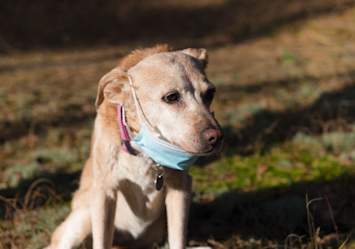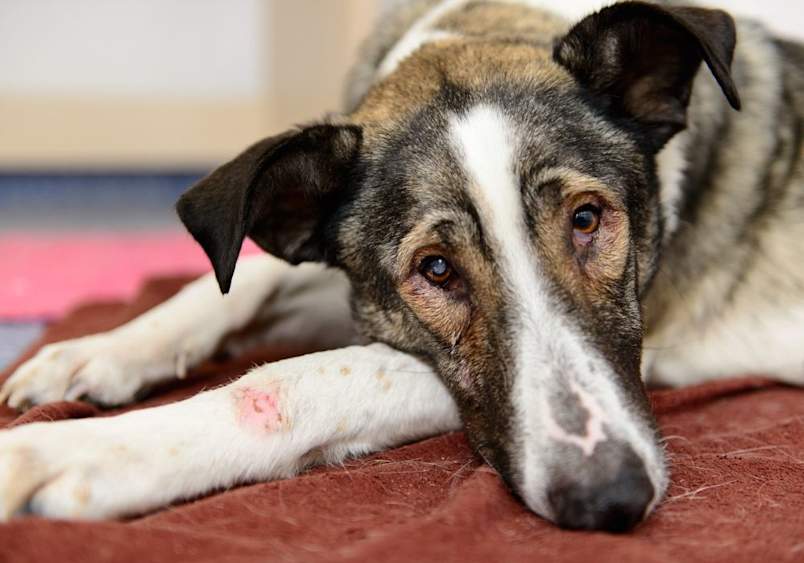
No one likes cold and flu season. No one except maybe the little viruses that cause it. Fortunately for our dogs, flu viruses tend to be species-specific meaning they don’t like to cross from humans to dogs and vice versa, but that doesn’t mean they won’t make the jump on occasion, a little something called reverse zoonosis. We’re not saying that you can’t spend time with your pup while you’re sick, but you should be sure to take some extra sanitary precautions to protect their health.
Influenza and Dogs
Influenza is a very prolific virus. You’ve likely heard of such things as swine flu, avian flu and even dog flu. These are aptly named based on the animals in which they were first found, but since then some have chosen not to stay within that species. Every flu virus is different with some making the interspecies jump and others preferring to stay in their lane.
Let’s look at canine influenza for example. This virus is very contagious among dogs, making boarding, dog parks, and groomers prime areas for transmission. It can cause a mild form with a cough and some other respiratory issues or a severe form where dogs develop a fever and potentially pneumonia. It doesn’t like other animals, so it tends to only infect dogs as far as we know.
Unfortunately, canine influenza isn’t the only way that dogs can get sick with the flu. Dogs can get the flu from humans, though this way is rare and it may not cause significant symptoms. Studies have shown that dogs can develop antibodies to human flu virus strains, suggesting they may have been exposed, even if they rarely experience severe illness.
Reverse Zoonotic Bacterial Infections
So, while it’s possible, it’s unlikely that your dog can get the flu from humans, but what about other illnesses? There are many bacteria out there that don’t care what type of warm body they infect. But don’t panic! These transmissions are rare and less likely to happen with proper hygiene. Also, on a positive note, they can typically be easily treated with antibiotics for dogs.
Salmonella
It seems like there’s always a Salmonella outbreak in the news. That’s because these bacteria are hardy little buggers that have adapted to survive in many environments, including you and your dog. Transmission of salmonella is spread through a fecal-oral route, so it would take you not washing your hands after using the bathroom and then petting your dog’s face to pass it along, potentially leading to vomiting, diarrhea and a fever.
Campylobacteriosis
Another fecal-oral digestive culprit is campylobacteriosis. Similar to salmonella, Campylobacter jejuni can get a dog sick when a human doesn’t properly wash their hands and then touches their dog’s face or food. Look out for vomiting, diarrhea, and not eating as well.
Methicillin Resistant Staphylococcus Aureus (MRSA)
MRSA is a type of staph bacteria that has become resistant to many of the antibiotics commonly used to treat ordinary staph infections. We’ve all grown to fear these bacteria, especially in a hospital setting since it can really create some serious complications. It can really complicate things for a dog as well. Humans with MRSA can pass the infection on to their dog, potentially causing skin, urinary or respiratory issues.
Tuberculosis
Tuberculosis can be passed in respiratory droplets from humans to dogs where it can cause the classic cough and difficulty breathing along with weight loss and even vomiting. While not all infected dogs show symptoms, it's crucial to consult your veterinarian if you suspect your dog may have been exposed or is exhibiting any concerning signs.
Other Reverse Zoonotic Illnesses
To round out other ways that dogs can get sick from humans, let’s look at the following:
COVID-19
There have been a small number of dogs that have shown up with antibodies to this well publicized virus. However, most of these dogs never showed signs or if they did, they were very mild. While it is possible, it’s unlikely that you will give your dog COVID—or at least you’ll probably never know if you did!
Mumps
Similar to COVID and some types of flu, the only real way we know that dogs can be infected with mumps is by testing for antibodies, which they have been found to develop. Fortunately, in this day and age, it’s rare that even humans get mumps, thanks to vaccinations, so it’s very unlikely you’ll need to worry about your dog with this one.
Ringworm
Now here’s one that we can really see when it infects dogs. Ringworm is a fungal infection of the skin that is highly contagious between animals and humans. Ringworm is caused by a type of fungus that lives on the skin, and as the name suggests, it often presents as circular patches of hair loss. These patches can appear red, scaly, and irritated, and some dogs may experience intense itching in the affected areas.
Illnesses that Sound Similar but Aren’t Actually Zoonotic
I feel like we should clear the air about some illnesses with similar sounding names that you may hear thrown around. We wouldn’t want to accidentally accuse an innocent microbe of crossing species, so here goes.
Bronchitis
Yes, both dogs and humans get bronchitis, just not from the same things. A human’s airways can become inflamed with a variety of bacterial or viral causes, leading to that tell-tale wheeze and cough.
A dog can also get bronchitis complete with a relentless cough but it likely won’t be caused by a human-borne illness. Instead, bronchitis in dogs is far more likely to come from a bacteria called Bordetella bronchiseptica or the parainfluenza virus, creating a condition called canine infectious tracheobronchitis, also un-affectionally known as kennel cough.
Herpes
Herpes is another infection in which there’s a human version and a dog version but no human-dog version. Herpes in people is often caused by herpes simplex virus (HSV)-1 or -2, leading to painful cold sores around or on a person’s lips.
Can dogs get herpes from humans kissing them? Not so much. Instead, dogs are susceptible to a herpes type all their own, canine herpes virus. This illness can lead to respiratory issues as well as genital bumps, but it doesn’t come from you, nor can it be passed on to people.

Preventing the Spread of Illnesses Between Humans and Dogs
Dogs are special, but keeping them healthy doesn't require any special techniques. Just sticking to the basics is typically enough to keep your dog from getting sick.
Hygiene Practices
There’s no such thing as too much when it comes to washing your hands, especially when you’re sick. Washing with soap and water after using the bathroom, blowing your nose, or coughing into your hands goes a long way towards keeping areas germ-free. Also, properly disposing of used tissues not only keeps your dog away from microbes, but also keeps them from shredding them, a mess you don’t want to deal with when you’re sick.
Regularly wash your bedding and blankets and disinfect surfaces like doorknobs and cabinet handles. I know your dog likely doesn’t use the doorknob, but these commonly touched surfaces can reinfect your hands which can then go on your dog.
Keeping your dog's belongings clean is just as important as practicing good personal hygiene. Regularly wash their bedding, blankets, and toys. Don't forget to disinfect surfaces they frequently come into contact with, like food and water bowls, and even their favorite spots on the couch. You might think they're just lounging, but those surfaces can harbor germs.
Regular Veterinary Care
Now, let's talk about another crucial aspect of keeping your dog healthy: regular vet check-ups. I know, I know. Vet visits can sometimes feel like a hassle. Life gets busy, and squeezing in another appointment can feel like a chore. Does it even matter? Your dog seems perfectly healthy. Isn't this just a waste of the vet's time?
Trust me, your veterinarian always wants to see your dog. So, if you’re wavering on whether you should bring your pup in for their wellness visit, do so. Your vet is your go-to source of knowledge for all things illness and prevention related. They can give you guidelines to follow when you’re sick and don’t want to pass it on to your dog and can help you recognize signs of illness long before they become severe. They can give you tips about symptoms to watch out for, how to tell if a dog has a fever, and what to do if your dog is throwing up or has diarrhea.
What If My Dog Gets Sick from Humans?
We’ve talked about how good hygiene and regular vet visits are essential for preventing the spread of illness between you and your dog. But let's talk about another crucial aspect of responsible pet ownership: preparing for the unexpected. Even with the best preventative care, our furry friends can still get sick. That’s where dog health insurance comes in, offering a safety net for those unexpected vet bills.
For example, consider a bacterial infection like MRSA, which, while rare, can be transmitted between humans and dogs. Treating MRSA in dogs can be complex and expensive. Diagnosis often involves costly bacterial cultures, and treatment may include specialized antibiotics, wound care, and potentially hospitalization. Hospitalization alone can cost hundreds to thousands per night, meaning the total cost of treating a serious MRSA infection could easily reach thousands of dollars.
These situations can quickly drain your savings. Pet insurance helps mitigate these financial risks by reimbursing you for a portion of covered veterinary expenses.
Limiting Close Contact When Ill
This is probably the last thing you want to hear, but keeping your dog close may not be the best thing for them while you’re sick. It’s true that snuggling your pup may be the only thing that makes you feel better when you’re struggling with the flu, but this may be the best time to give them some space. Generally speaking, the more contact a dog has with a potentially reverse zoonotic illness, the more chance they have of getting it themselves. Save the really close snuggles for when you’re feeling better.
So, Can You Get Your Dog Sick?
As if you needed another reason to despise cold and flu season, here’s one more: dogs can get the flu from you. Though cases of transmitting the human flu and other illnesses to dogs is rare and they likely won’t get really sick, it’s still a possibility to be aware of.
So, while you probably don’t have to quarantine yourself from your dog every time you sniffle, it’s good to be aware. A little extra hand washing and some common sense can go a long way in keeping everyone in your house healthy and happy – especially the furry ones.